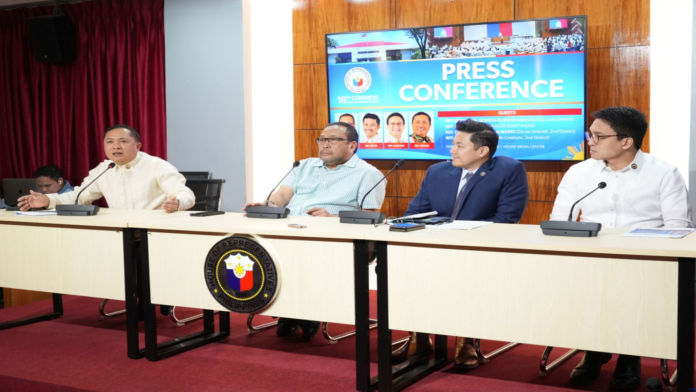Several members of the House of Representatives on Wednesday debunked warnings made by their former colleague that inserting the phrase “unless otherwise provided by law” to the 1987 Constitution’s economic provisions would draw “lobbying money” to Congress.
“Ang sabi (They are saying that), if you give the legislative power to Congress to change the proportion of ownership as provided for by the Constitution, masa-subject daw kami sa mga magla-lobby. Sa akin, pananakot lang ‘yan (we will be subjected to lobbyists). For me, that’s just scare tactics),” House Deputy Majority Leader and Mandaluyong City Rep. Neptali Gonzales II said in a press briefing.
Gonzales said the law should not remain static, as it must “evolve to address the present conditions and needs of the country.”
The House of Representatives, convening as a Committee of the Whole, is now deliberating on Resolution of Both Houses (RBH) No. 7, aiming to ease constraints on specific economic provisions of the 37-year-old Charter by inserting the phrase “unless otherwise provided by law.”
One of the key proposed economic reforms aims to reassess the 60-40 equity rule on foreign ownership, which currently limits foreigners to owning up to 40 percent of companies in the Philippines. This rule has long been identified as a significant barrier to substantial increases in foreign direct investment and impeding the country’s economic growth trajectory.
During Tuesday’s deliberation, Bayan Muna chairperson and former congressman Neri Colmenares cautioned that the proposed amendment could lead to the centralization of powers in Congress, and the influx of lobby money into the legislature.
Davao Oriental 2nd District Rep. Cheeno Miguel Almario, South Cotabato 2nd District Rep. Peter Miguel and Anakalusugan party-list Rep. Ray Reyes agreed with Gonzales’ position.
Almario said contrary to suggestions of coercion, the insertion of the phrase “unless otherwise provided by law” has the potential to address specific needs and services required by foreign direct investors, which could contribute to improving the nation’s status and conditions.
The phrase also offers Filipinos a degree of flexibility to maximize investments entering the country, he said.
“We can rely on the ‘otherwise provided by law’ to further enhance, to further tailor fit the needs of the country,” Almario said.
Meanwhile, Miguel stressed on the significance of the phrase, underscoring the need for Congress to remain flexible in shaping laws that adapt to global shifts and sustain competitiveness.
“‘Yung phrase na ‘unless otherwise provided by law’ sa tingin ko perfect po ‘yan na phrase. Dahil (for me, it is a perfect phrase. Because) in the context of globalization, kailangan natin ang Congress may leeway, kahit paano may legroom (Congress should have a leeway, some sort of legroom) to make laws that are adaptable to changes that are more competitive,” Miguel said.
“So, if there is the ‘unless otherwise provided by law,’ we’re giving the Congress a more exhaustive, deliberative, detailed manner of creating a law that would be suited for global competition,” he added.
For Reyes, the phrase promotes flexibility and adaptability in the legislative process.
“By establishing these qualities, we’re setting up a framework for future Congresses to adjust according to the needs of the times,” Reyes said. (PNA)
Photo credit: House of Representatives Official Website


